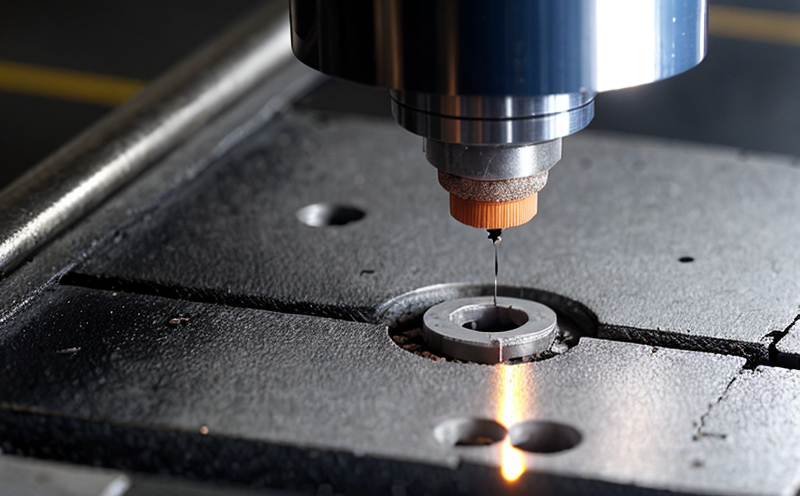IEC 60749-40 Functional Reliability Failure Testing
The International Electrotechnical Commission (IEC) standard IEC 60749-40 is a crucial framework for the functional reliability failure testing of microchips and semiconductors. This standard ensures that semiconductor devices meet stringent performance criteria under various environmental conditions, which are critical to ensure their long-term reliability in real-world applications.
IEC 60749-40 specifies methods for assessing the functional reliability of semiconductors by simulating operational stress scenarios. These tests evaluate how well a semiconductor device withstands specific stresses like temperature cycling, voltage spikes, and current surges. The standard is particularly relevant in industries where failure can lead to significant economic losses or safety hazards.
The testing process begins with thorough preparation of the specimen. This involves selecting representative samples from the production lot and ensuring they are free from any defects that could skew test results. Once prepared, the specimens undergo a series of functional tests designed to mimic the actual conditions they will encounter in use. These tests include:
- Thermal cycling
- Voltage stress testing
- Current surge testing
- Environmental exposure
The instrumentation used for these tests is highly sophisticated and includes temperature-controlled chambers, high-voltage power supplies, and current measurement equipment. Each test parameter is meticulously monitored to ensure accuracy and repeatability.
After the specimens have been subjected to all required stress scenarios, they are inspected for any signs of failure or degradation in performance. This inspection involves detailed visual checks as well as functional tests to confirm that the device still operates within its specified parameters. Any failures detected during this phase are thoroughly documented and analyzed using advanced defect characterization techniques.
IEC 60749-40 is widely recognized for its comprehensive approach to ensuring semiconductor reliability. This standard is particularly useful in industries such as automotive, aerospace, and medical devices where the failure of a single component could have catastrophic consequences. By adhering to this standard, manufacturers can demonstrate that their products meet international quality standards.
The process of functional reliability testing helps identify potential issues early in the product lifecycle, allowing for corrective actions before mass production begins. This not only improves the overall quality of the final product but also reduces costs associated with rework and warranty claims.
Benefits
Adopting IEC 60749-40 Functional Reliability Failure Testing offers numerous benefits to semiconductor manufacturers, including:
- Enhanced Product Quality: The standard ensures that only high-quality products reach the market.
- Improved Customer Satisfaction: Reliable products lead to satisfied customers who trust your brand.
- Increased Market Share: By meeting international standards, you can expand into global markets.
- Reduced Warranty Claims: Early detection of defects minimizes post-purchase issues.
- Cost Savings: Preventive measures reduce the need for costly recalls and repairs.
- Regulatory Compliance: Adherence to international standards ensures compliance with regulatory requirements.
- Better Product Design: Insights gained from testing refine future product designs.
In summary, IEC 60749-40 Functional Reliability Failure Testing is a vital tool for ensuring the reliability of semiconductors and microchips. It helps manufacturers produce products that meet international standards, thereby enhancing their reputation and competitive edge in the global market.
International Acceptance and Recognition
The IEC 60749-40 standard has gained widespread recognition across various industries due to its rigorous testing methods. Its acceptance is evident from the numerous international standards it references, such as ISO, ASTM, EN, and IEC itself. This broad acceptance underscores the standard's credibility and reliability.
Many multinational corporations have incorporated IEC 60749-40 into their quality management systems to ensure that their products meet stringent performance criteria. The standard is particularly popular in sectors like automotive, aerospace, and medical devices where product failure can lead to significant economic losses or even safety hazards.
The global acceptance of this standard also extends to its use by regulatory bodies worldwide. Compliance with IEC 60749-40 is often a prerequisite for obtaining international certifications and approvals. This ensures that products meet not only local but also international standards, thereby facilitating easier market entry in different regions.
Moreover, the standard's acceptance has led to increased collaboration between manufacturers and researchers from various countries. This collaborative environment fosters innovation and continuous improvement in semiconductor technology. By adhering to this standard, manufacturers can ensure that their products are not only reliable but also competitive on a global scale.
Environmental and Sustainability Contributions
The implementation of IEC 60749-40 Functional Reliability Failure Testing contributes significantly to environmental sustainability. By ensuring the reliability of semiconductors early in the product lifecycle, this standard helps prevent failures that could lead to waste or pollution.
One key aspect of this contribution is the reduction in product returns and replacements due to defects. This not only saves resources but also reduces energy consumption associated with manufacturing and shipping replacement parts. Additionally, by identifying and addressing issues early on, manufacturers can minimize the environmental impact of product lifecycle management.
The standard's emphasis on functional reliability also promotes efficient use of raw materials. By ensuring that products meet performance criteria under various conditions, manufacturers can optimize material usage during production processes. This leads to a more sustainable approach to manufacturing, where resources are used efficiently and waste is minimized.
Furthermore, the testing process itself contributes indirectly to sustainability by driving innovation in testing methodologies. Researchers and engineers continuously refine their techniques to ensure that tests are both effective and efficient. This ongoing improvement helps reduce the overall environmental footprint of semiconductor production processes.





